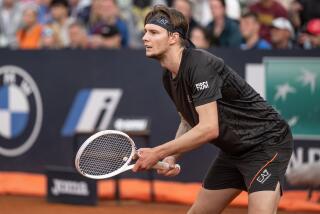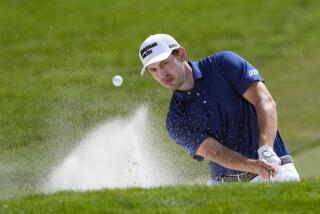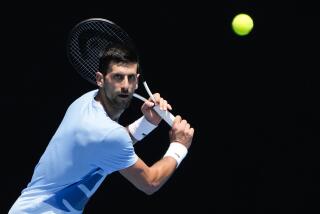Booming Again : Germany’s Boris Becker, Who Hasn’t Won a Grand Slam Tournament Since 1991, Has His Game in Order and Is a Genuine Threat to Win the U.S. Open
- Share via
For Boris Becker, the afternoon of Aug. 5 at the Los Angeles Tennis Center at UCLA began like just another summer day at the office. It was oppressively hot, there were a few thousand well-dressed fans on hand to watch this Friday quarterfinal and he was the player they had come to see.
Becker was in Los Angeles to play in the L.A. Open, but the site and event mattered little. It could have been the Dubuque Open or the Daktar Classic, just as long as it was played on hard courts similar to those used for the U.S. Open. Pro tennis players live for the Grand Slam events and use tournaments in between as sharpening tools for the mind and body.
On this day, Becker was dull of both.
He was facing a little-known fellow German, Karsten Braasch. Becker is a household name all over the world, Braasch barely outside his own household. Becker has won three Wimbledon titles and two other Grand Slam events.
In a 1991 poll in Germany, Becker had a 98.1% recognition rating. The only thing Germans might recognize about Braasch is that he has one of the strangest serve windups, the kind that would awe a contortionist.
So the only thing of note was that Becker was losing, although even that wasn’t real headline fodder anymore, since Becker had been doing a lot of that since winning his last Grand Slam title, the Australian Open, in 1991. The last time Becker played in a Grand Slam final was his 1991 Wimbledon loss to Michael Stich. The last time he was No. 1 in the world was also 1991.
Now he was No. 11 and trailing a 5-foot-11, 160-pound left-hander who not only served like a surfer wriggling out of a wetsuit, but also patted the ball around the court like a weak Brad Gilbert. Against this, Boris (Boom Boom) Becker was being rendered as ineffective as a pop gun. He trailed, 6-2, 3-0. And shortly, it was 6-2, 5-4, with Braasch serving at 40-15.
Two match points against Becker. The rustle in the crowd was noticeable. It was to be another disappointment for his fans, another reason to nod knowingly while heading for the exits. Was the young man who had won a Wimbledon title at 17 years 7 months washed up at 26 years 8 months?
Braasch stepped to the service line, unwound and sent a dart down the middle. The ball hooked just wide of the center line, missing as a match-winning ace by perhaps half an inch.
Boris Becker’s comeback had begun.
Were it to culminate with a victory in the U.S. Open, which begins Monday in New York’s Flushing Meadow and ends with the men’s final Sept. 11, it will not be too great a stretch to point to the Braasch match--and that half-inch miss--as the turning point for Becker.
Braasch double faulted on his second serve, choked a passing shot into the net on the next match point and went on to lose the game, the ensuing tiebreaker, 7-1, and the third set, 6-2.
Afterward, Braasch said, “When you are serving for the match at 5-4 and it is Boris Becker on the other side of the net, you can’t help but be thinking that it is Boris Becker.”
For Becker, it was another resurrection in a career of many.
When he won the 1989 U.S. Open, he survived two match points against Derrick Rostagno in the second round. Now, having survived by half an inch against Braasch, Becker went on to beat Jason Stoltenberg in the semifinals, 6-4, 6-4, and Mark Woodforde in the final, 6-2, 6-2. It was only his second title on the ATP Tour in 30 events.
The next week, he went a few rounds before losing to Amos Mansdorf in Cincinnati, then followed that up a week ago by going through a strong field at the Volvo International in New Haven, Conn., without losing a set.
After dispatching Switzerland’s Marc Rosset in the Volvo final, Becker said, “It’s the best I’ve played all year.”
So now, on the eve of the U.S. Open, the boom is back in Boris.
But where had it gone?
The short answer is that Becker, after 10 years on the tour, decided he wanted a life. But he decided he would acquire one in a different manner than, say, Bjorn Borg, who just walked away from it all one day. Becker married girlfriend Barbara Feltus, had a son and kept on playing, although with diminished intensity.
“I knew that I wasn’t in the greatest frame of mind,” he said. “But I was still around and I still had the atmosphere of tournaments and I was physically in pretty good shape. I knew that the risk of taking a long break and coming back was much greater than of playing along and of playing tournaments. I thought it was the better thing to do.”
Becker said most people, especially the press, couldn’t comprehend what he was doing.
“For some reason, it didn’t fit in the picture when a man took time out to fix his private life,” he said. “It didn’t make a good story that a guy would actually, not really take time off, but not concentrate so hard anymore because you had to deal with other things.”
Almost from that day in 1985 that he hustled and belly-flopped his way to a Wimbledon title and into the hearts and psyche of tennis fans everywhere, Becker has been something of a tortured hero.
Alan Richman, writing in Gentlemen’s Quarterly in 1991, characterized Becker’s life as Celebrity Hell. In a recent interview with The Times’ Jim Murray, Becker responded to a question about always being favored to win matches by saying, “It is a burden I’ve carried for 10 years. I’ve just learned to cope.”
Part of the reason for Becker’s special celebrity is that, unlike some of his fellow touring pros, he has a highly operable muscle above his shoulders. He is Boris, the philosopher, the Socrates of sport.
Shortly after winning his first Wimbledon title, he told a reporter about going home for a few weeks to his native Leimen, resting for a while and then going out to practice one day. Turning out to watch him were thousands of Germans, which prompted the then 18-year old, suddenly feeling like a pied piper, to theorize that he now better understood how the “Hitler thing” happened.
He has been a spokesman for UNICEF but was asked to step down when he refused to sign a paper saying he would never play in South Africa. It wasn’t that he approved of apartheid. It was just that he refused to sign away that sort of lifetime freedom of choice.
He once drove a Porsche through the back roads of Germany at speeds approaching 200 m.p.h., then expressed his embarrassment and regret when stopped by the police. He told Richman that he would sell the Porsche because he was already endorsing Fords and, because they were paying him nicely to do so, it was only fair of them to be upset with his Porsche escapade and only fair of him to be fair with Ford.
When he started slowly in the L.A. Open against Chuck Adams, before going on to win, 7-6, 6-1, Becker was asked about it and said, “It is not that I am necessarily a slow starter. I am a big finisher. Let’s put it that way.”
And when asked recently what his approach was to getting through a tournament, he said, “I do all I can to get to the semifinal. Once you get there, if God wants you to go on, you will.”
After God, perhaps those best able to measure Becker’s possible advance to the U.S. Open title are the Las Vegas bookies, who have Becker as a second choice behind defending champion Pete Sampras.
An uninjured Sampras has been a notch above all the others for about a year and a half, but Sampras continues to nurse a sore ankle, making this tournament much harder to call than expected.
“Sampras has been above everybody else for quite a while now,” Becker said. “It has been like him up here and then a few of us playing to see who is No. 2 and 3 and 4. So we just like to bother him a little once in a while.”
Indeed, as poor Karsten Braasch can verify, when it is Boris Becker on the other side of the net, you can’t help but be thinking that it is Boris Becker.
Maybe even if you are Pete Sampras.
Times staff writer Wendy Witherspoon contributed to this story.
More to Read
Go beyond the scoreboard
Get the latest on L.A.'s teams in the daily Sports Report newsletter.
You may occasionally receive promotional content from the Los Angeles Times.











